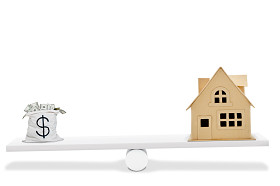Homeownership elusive more than 10 years after foreclosure
by Broderick Perkins
(11/6/2012) Don't buy into foreclosure rescue or strategic default advice that you'll return to homeownership soon after the lender repossesses your home.

It'll be at least a decade before you return to homeownership after foreclosure and even within that time, only about one in ten foreclosed homeowners will likely manage to own a home, according to a "Credit Access Following a Mortgage Default," economic research by the Federal Reserve Bank of San Francisco.
More than 12 years after suffering foreclosure, only about 12 percent of homeowners returned to homeownership, according to consumer loan data from the first quarter of 1999 to the fourth quarter of 2011 collected by Equifax, a major credit-reporting agency.
The reserve bank said a decade of inaccessibility to homeownership will come largely from "long lasting," "sharp drops" in credit scores. A lowered credit score is exacerbated by the tendency of defaulting mortgage borrowers to also default on other types of credit.
Regardless of their pre-foreclosure credit score, most borrowers who suffer foreclosure end up with a credit score below 600 - a level at which it's nearly impossible to buy a home today.
Among designated "subprime borrowers" (not to be confused with subprime mortgages), those who had credit scores below 650 when they first received their mortgage, only about 10 percent managed to return to homeownership at the end of 12.5 years.
There was more hope for "prime" borrowers, those who had credit scores above 650 when they first landed a mortgage. Among prime borrowers, a cumulative of nearly 20 percent returned to homeownership after 4 years, 30 percent after six years and nearly 40 percent at the end of 12.5 years.
Tougher than ever to return to post-foreclosure homeownership
The study also reveals it's "significantly slower" today to return to homeownership after foreclosure, than it was years ago.
After about three and half years, some 17.5 percent of borrowers who defaulted in 2001 had returned to the mortgage market and some 23 percent of borrowers who defaulted in 2003 had returned, but only about 4 percent of borrowers who defaulted in 2008 had returned to the market after three and a half years.
The slower return rate in 2008 could be due to a convergence of factors that didn't exist a decade ago.
• Less demand - "The Great Recession that began in 2007 was much deeper than the 2001 recession, and uncertainty about jobs or future income prospects may have made people unwilling or unable to demand housing at the rate seen after previous recessions," the study found.
• Tighter money - With the onset of the Great Recession, lenders tightened purse strings. "The mortgage finance system was severely disrupted during the financial crisis of 2007—2008. The 2009 and 2010 mortgage default cohorts (not displayed in the survey) look very similar to the 2008 group...By contrast, the credit environment for the 2001 and 2003 cohorts was very different in the years after their defaults. Loan terms were generally easy and subprime mortgage lending boomed," the study says.
There's one bright spot in the study some homeowners have strategically counted on when they face foreclosures by default or by their own doing.
If you've got a mortgage that costs you $500, $1,000, $2,000 a month or more, that's how much financial breathing room you get each month when you are unable to or choose not to pay your mortgage.
You can apply that to other debts to keep them from defaulting and perhaps save some of your credit score.
"Housing expenditures are typically about 30 to 35 percent of total household income. For many overstretched borrowers, defaulting on a mortgage and becoming a renter reduced housing expenditures considerably, although the quality of their living quarters was lower. Furthermore, the extended period between mortgage default and foreclosure allowed many borrowers to remain in their homes for a while rent-free," the report said.
Other related articles:
FICO Mortgage Score could ease home loan underwriting squeeze
Understanding Credit Cards: Types of Credit Accounts
Good news in foreclosure rescue scam reports tracking to double in 2012
Maintaining credit health much like maintaining physical health
Mortgage strike devised to leverage mortgage relief from lenders for underwater homeowners
Ranks of underwater homeowners shrinking, boosting housing recovery
Rise in mortgage distress calls could signal an unexpected surge in foreclosures
Infographic: Strategic defaulters rushing to beat mortgage debt relief deadline
More homeowners consider strategic defaults, perhaps to their detriment
Fannie Mae & Jumbo Mortgage Rates
Just One Click! = Current Rate Chart

Start by selecting your state

Nancy Osborne
Lenders Double Down on Car-Title Loans Attempting to Stay Ahead of Regulators
Need Cash Fast? Beware of Greedy Lenders Waiting to Exploit You
You and Your Credit; Make it a Happy Ongoing Relationship
Identity Theft: Violent crime has given way to Cybercrime.
Drawbacks to a Reverse Mortgage: Detracts from Medicaid Benefits, Repayment Triggers, etc
Selecting the Best Mortgage Rate
The ABCs of Collateralized Debt Obligations (CDO) & Credit-Default Swaps (CDS)
Refinancing: Selecting a Loan

- Mortgage Program Options
- Interest Only Mortgage
- 100% Mortgage Financing - No Down Payment
- Mortgage Rates Comparison
- Search for Mortgage Rates
- No Costs Mortgage Refinancing
- 2% Rule - Refinancing Mortgage
- Yield Spread Premium
- Prepayment Penalty - Mortgage Refinancing
- What is APR and how is it calculated?
- Private Mortgage Insurance - Refinancing
Moving Ahead With Your Refinance
Get the Updated and Improved Mortgage Rates App from ERATE.com
FREE Mortgage Rate WidgetsYour State's Rates or National Rates Get this Widget for any State you want


